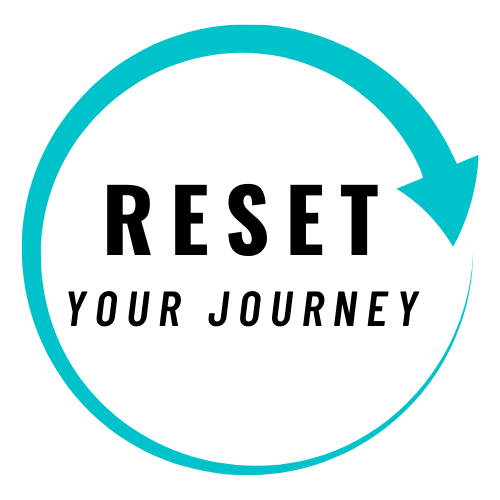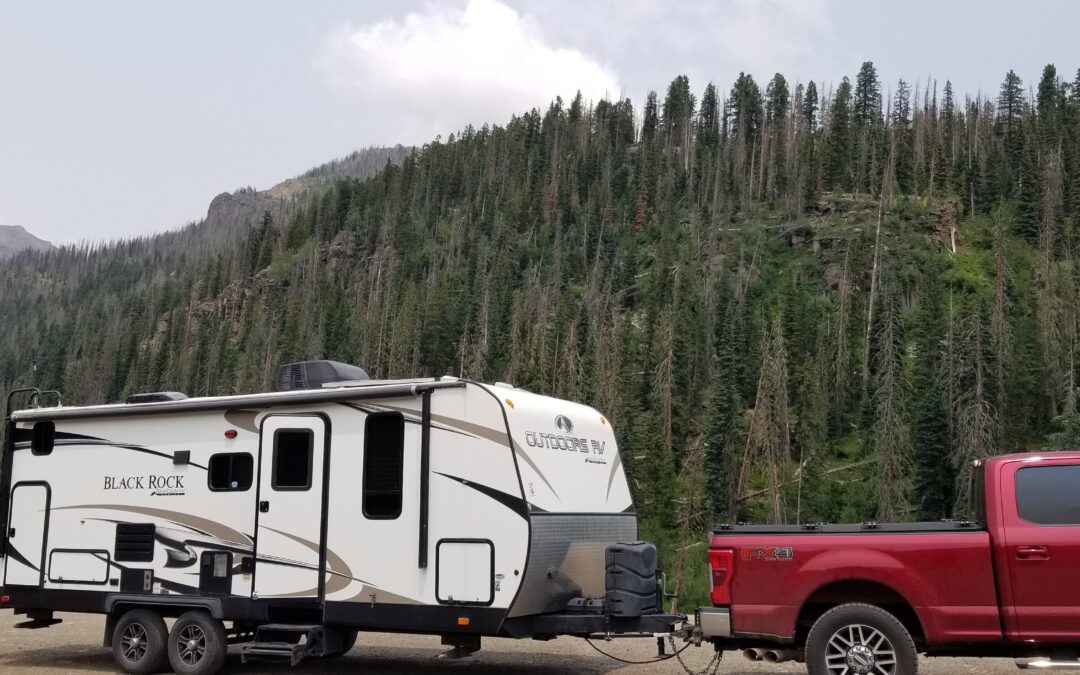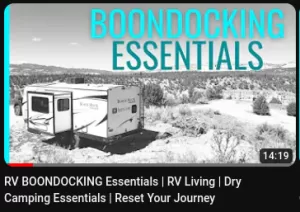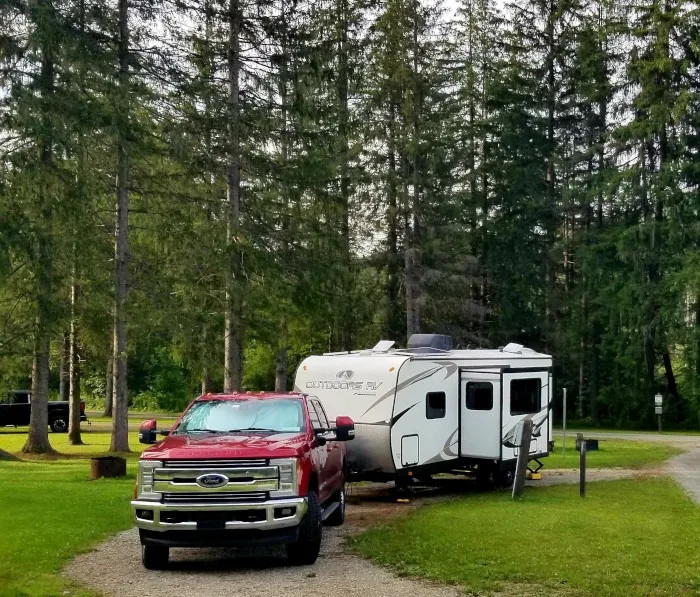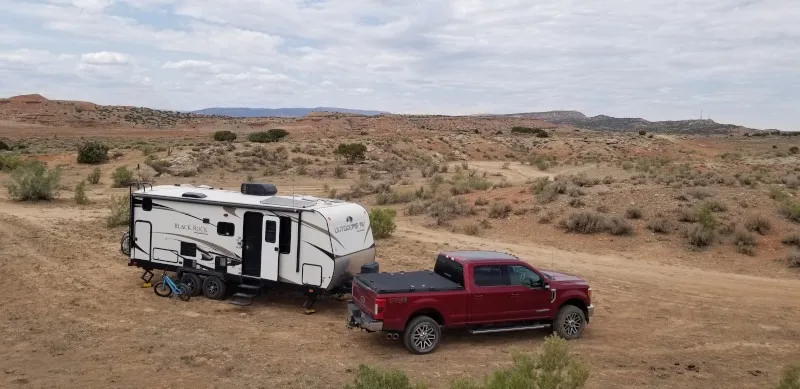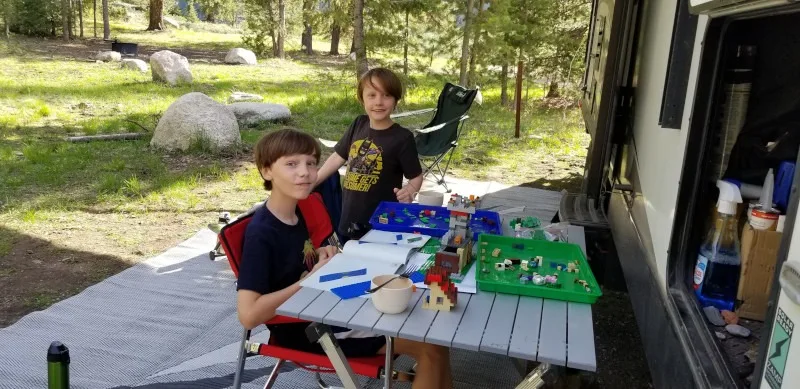Last Updated on 04/16/2024 by Glynn Willard
Full Time RV Living Monthly Costs
We averaged $2200 a month RV full-time living once we mastered the technique of living full-time in a travel trailer. Read on to learn more…
How We Prepared Our Finances For Full-Time RV Living
Just getting one’s finances in order to begin with is a challenge for many in a traditional home. But preparing to uproot your family, sell everything, move your family into an RV, and gallivant all over the United States is another level of financial challenge.
Do you already have a good idea of the cost and a financial plan?
If not, let’s look at some of the financial challenges you’ll face full-time RV living. And also, some of the expenses you’ll face preparing to live in an RV.
RYJ Takeaways:
- Avoid a new rig at all costs. A used RV is the way to go, period and new RVs haven’t been “shaken down.”
- Make sure you budget enough money to take the first couple of weeks off from work (at a minimum). It’s overwhelming enough without having to work.
And it’s a great way to get acquainted with the new lifestyle. - Keep $10k at a minimum set aside for emergencies, maintenance costs, and rig repairs.
- If you don’t already, start tracking your finances several months before leaving.
- You will spend more money in the beginning than you expect. Once you have the lifestyle figured out, it’s easier to reign in the expenses and your average cost will go down.
- Set up at least three accounts to keep specific funds separate in case one is compromised. This is a smart move for any financial situation.
- If you can help it, get rid of the debit card and only use a credit card.
What Are Some Unforeseen Expenses (And Some Of Our Expenses) Before Full Timing?
RV travel can be expensive. Here are some expenses that might sneak up on you that seasoned RV owners already realize:
- Servicing the engine on the RV or Tow Vehicle before departing (varies, but not cheap).
- Setting up the RV Insurance policy.
- Having the hitch professionally welded and aligned for the tow vehicle and trailer ($160).
- Backup battery source ($1100)
- Water Filter System for Rig ($200)
- Additional water storage system. We like Scepter jugs ($100)
- Organizational/Rig Necessities ($700)
- Portable air compressor for tire maintenance ($200)
- Topping off the propane tanks at Tractor Supply ($30).
- Stock up on pharmaceuticals (Varies depending on your insurance coverage).
- We were not prepared for the realistic cost of laundry facilities.
You Need A Financial Plan
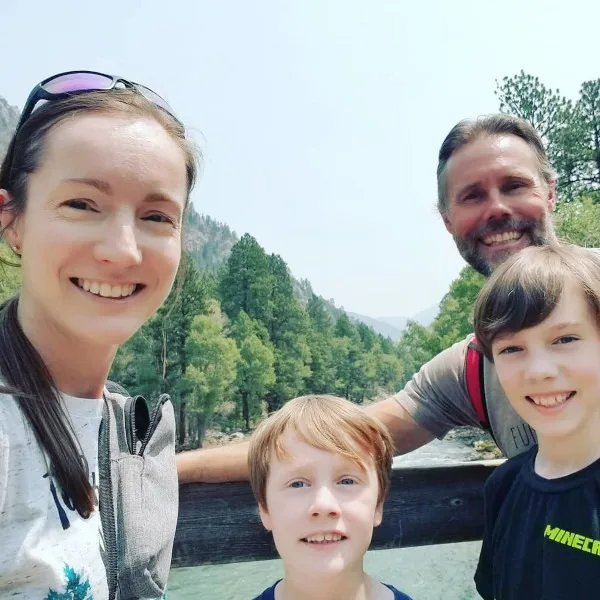
The bottom line, a financial plan for full-time RVers is a necessity. But it’s not rocket science.
Whatever you currently spend now on your monthly budget will be close to what you spend full-time if you move infrequently.
But move every few days and your fuel costs will easily exceed your old mortgage or rent.
Of course, if you finance your rig and toad/tow vehicle, your monthly payments are going to escalate quickly. I don’t recommend this as an option unless you have a stable income on the road.
Whatever type of budgeting or planning system you use is up to you. But, without a plan and tracking system, you’ll “accidentally” blow through too much money quickly.
So, if you haven’t already, start tracking your finances now.
Debt Free Is The Way To Go
I get it. That’s the goal for most. Starting on the road may have to be preceded by giving up your primary residence and living with family while paying off your debt.
And again, try not to finance a brand new RV to go full-time. A better option is to buy something used that you can afford with money left over for emergency maintenance.
Even if you’re sitting on a pile of money with a high salary, it’s still senseless to maintain an RV payment.
When my business was making us a lot of money, I was far more cavalier about expenses. But even then I would not have accepted such a rapid depreciation (on a liability).
Besides, the lessons we learned with our used rig have been priceless. And it’s better built than most new rigs. I’m definitely a fan of Outdoors RV!
Takeaway: The best way is to avoid a new rig at all costs. Used is the way to go, period.
How Long Do You Plan To Travel?
Give yourself a definitive quantified timeline. Then set your budget to that timeline. You don’t have to stick to it, but you need a starting point and an arbitrary end for calculating finances.
If your funding is low and you have no income, shorten your trip, so that it fits into your budget.
It’s astounding the opportunities that present themselves while you’re on the road. If you’re between jobs, it’s also eye-opening to see how other people make a living.
Ideas and opportunities present themselves when you clear your mind with camping. That’s my stance and I” ‘m sticking to it!
Can You Work During The First Part Of Full-Time RVing?

We tried work camping once.
Don’t count on working at all if you’re trying to get somewhere far away quickly. This is especially true if you’re new to the limited space of the RV lifestyle.
Even if you stay close to start and move every few weeks, there’s still a steep learning curve. You can only spread your energy so thin.
Takeaway: Make sure you budget enough money to take the first couple of weeks off from work (at a minimum). It’s overwhelming enough without having to work. And you’ll appreciate the additional time to get acquainted with the new lifestyle.
What Will You Maintain As A Monthly Income?
If you already have a mobile job with a fixed salary, this is easy. The complicated part is acquainting yourself with the new lifestyle while working.
And securing reliable internet in your rig. It can certainly be done, but the financial barrier can be steep initially.
We’re good at finding public WiFi and using a VPN to do our work. It’s funny how the clock no longer dictates when we work.
Access to WiFi or a strong cellular data signal determines that time frame for us.
If you’re living off savings while building a business, sticking to your weekly/monthly budget is crucial.
To state the obvious, divide the non-emergency fund savings by the total months of travel.
Then stay under that number each month. Make sure you build in money for excursions and a few treats. You’ll go nuts if you don’t!
And you’ll likely still do those things even if it’s out of your budget. So, build it into the budget. I’m just being realistic!
How Much Should You Keep In Your Fulltime RV Emergency Fund?
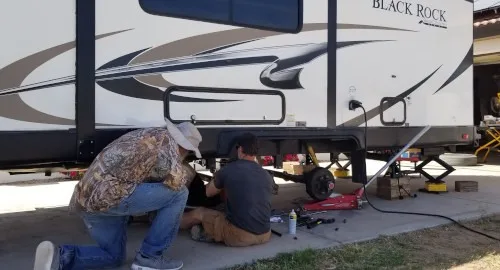
We saved money by doing repairs ourselves.
To maintain peace of mind, I would not have less than $10k in an account already budgeted for rig/auto repairs or medical emergencies.
It’s as simple as that. That money is not to be used for anything else, period.
If you never use it when you finish, invest it and keep it as an emergency fund. There’s a lot to be said for being prepared.
Takeaway: Keep $10k at a minimum set aside for emergencies and rig repairs.
What Does Your Family Currently Spend Each Month For Everything?
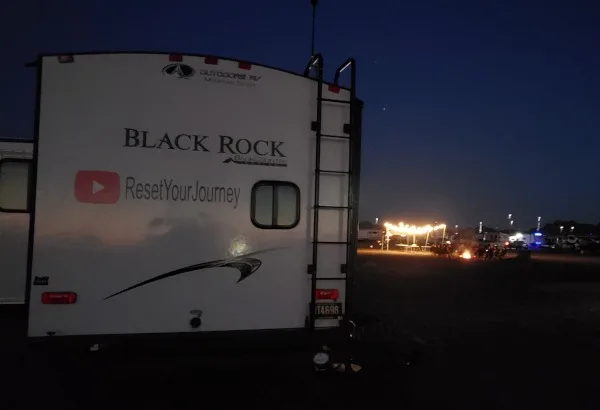
We made friends through boondock gatherings.
We addressed this earlier. But if you don’t currently track your finances, it’s time to start.
I like using open-source software, but if you’re a fan of Quicken or some of the more popular software, that’s fine.
I used QuickBooks for my business and Quicken when I lived in a sticks and bricks home.
I currently use GnuCash for both the online business and personal finances. If you don’t have any experience with bookkeeping or accounting, there’s a learning curve. But the price is right!
Takeaway: If you don’t already, start tracking your finances several months before going full-time.
Can You Trim Expenses To Take More Adventures?
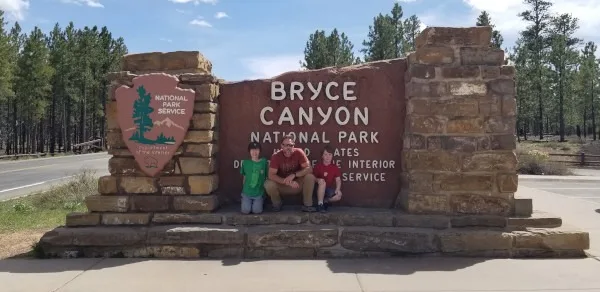
There are a lot of blogs and vlogs from full-timers suggesting all kinds of great gear. Seriously, take it with a grain of salt.
Just because they recommend it, doesn’t mean you need it (whatever it is). There are ways to acquire all kinds of things on the road.
Pack less and wait a few weeks to see what you really need. Then use the saved funding to do fun things! You’ll also appreciate less weight in your rig. I can’t stress this enough!
Full Time RV Living Monthly Costs
Other blogs state $2-4k a month depending on the family size. I agree.
Our first month was more expensive because we moved frequently to escape the cold. We spent $360 in fuel the first week alone from towing daily. Diesel adds up fast!
Fast forward two years and some long haul weeks totaled $1000 in diesel due to high fuel prices.
That said, as we mastered the technique of living full-time in a travel trailer, we averaged $2200 a month.
By the way, travel trailers are one of the least expensive RV’s to maintain.
We avoid RV parks and campground fees by boondocking on public lands almost exclusively, so we save a lot by not using campgrounds.
We also used a National Parks Pass to spend a lot of our “entertainment time” at National Parks.
You’ll Spend More In The Beginning Than You Think.
Your initial destination plays a role in your expenses. For instance, if you’re trying to escape hot or cold weather, you’re likely going to drive daily.
And let me just say, that moving your tiny house every day is exhausting.
We fast-tracked it to Florida to escape the cold averaging 250 miles a day. Our fuel costs added up very quickly.
We also incurred more campsite fees because we were not yet skilled with boondocking.
If you’re not careful with your grocery store trips, you’ll spend more than usual on your grocery bill. Because you can’t store as many groceries, you’ll go more frequently.
And it’s easy to spontaneously buy things you don’t need, just because you’re there. Oh, and keeping up with store coupons is nearly impossible.
I’m not a fan of Walmart, but so far, it’s the least expensive place to shop and our rig easily fits in the parking lot.
Every time I shop there, all I can think of is Adam Sandler smashing a canned good on the floor and saying “Microsoft stock is down kid, we gotta save money.” A bit extreme, but you get the point.
Takeaway: You will spend more money in the beginning than you expect. Once you have the lifestyle figured out, it’s easier to reign in the expenses.
Where Should You Keep Your Money?
Set up several accounts to separate what you’re keeping in savings, spending on the trip, and for emergencies.
If one account is compromised, you have others to make up the difference while you’re recouping any damage.
I keep two months of funds in one checking account. There’s an additional checking account for the emergency funds.
And finally, everything else stays in an interest-bearing savings account connected to the investment portfolio.
I move money into the travel checking account as needed.
It goes without saying that all of these accounts should be mobile-friendly.
Takeaway: Set up at least three accounts to keep specific funds separate in case one is compromised.
Should You Carry A Lot Of Cash In An RV?
Absolutely not! It’s not worth the risk. Keep some cash for small expenses or boondocking fees.
Otherwise, use a credit card. It’s safer and easier to track your expenses.
It pains me to say this as someone who owned a small business with high merchant fees, but the rewards on credit cards help when you’re on the road.
Not Sure What You Need For Your RV?
Credit Card or Debit Card?
Don’t even get me started. I don’t believe in using debit cards, but unless you bank at a national bank, walking in and withdrawing cash from a teller is not an option.
So, use your debit card as an ATM card. Otherwise, make all of your purchases with a credit card.
If it’s compromised, it’s a lot less of a hassle. And you haven’t lost your money in the bank.
If you use a debit card, only keep a small amount of money in that account and transfer funds in as needed.
It’s a pain until it’s compromised and you don’t have the necessary funds to travel. In other words, it’s a pain that’s worth the effort!
Takeaway: If you can help it, get rid of the debit card and only use a credit card.
How You’ll Save Money Full-Time RV Living
Here are a few savings tips and expenses that you’ll not have to deal with on the road if you first sell everything:
- No more property taxes.
- Depending on the type of RV, it will likely cost less than mortgage payments on a small house.
- No more rent if you live in a studio apartment.
- No more upkeep or yard work on a small house.
- RV insurance is usually less than homeowners insurance.
- RV clubs like FMCA or Passport America can offer a significantly discounted rate on health insurance, camping fees, mobile internet connection, fuel, and tire replacement to name a few.
- Avoiding over-priced luxury RV resorts and staying off the beaten path or dry camping on public lands will offer a lower cost per month.
On a side note, solar panels and a large battery bank will cost you more in the long run than using a small generator for your RV.
Conclusion
There are several important takeaways from the article. Primarily, it’s to track your finances! Whatever method you use is moot, just do it.
Secondly, keep your money in separate accounts in case you are compromised. It also helps to prevent you from spending your emergency funds.
Third, inflate your perceived expenses by at least 10% on the road. Money evaporates if you’re not careful!
Fourth, avoid using a debit card for purchases and stick to a credit card. It’s safer.
Fifth, you can reduce your monthly expenses by boondocking on public lands or staying in state parks.
Lastly, stay under your monthly budget. After several months, you’ll have additional funds for saving, investing, or doing something fun.
Isn’t that the whole point of uprooting your family and going full-time in an RV?
How do you track your funds and stay on budget on the road?
FAQ
- Cost to RV full time?
Again, a subjective number, but for most we’ve spoken to, it’s about the same as they were spending owning or renting a home. We averaged $2200/month, which was much less than living in a large house for us.
- What’s the cost to insure an RV?
Trailers are the least expensive (ours was under $400/year), class B’s are around $700/year and Class C’s and A’s (large RVs) are more, but all over the place.
- How do I find the RV value Kelley Blue Book?
Actually, go to JD Powers site to find the value of an RV, which will help you factor your budget for fulltime RV living.
Meet the author.
We appreciate any help in bringing you great content. Donate or buy us a coffee on our Ko-Fi site. Or subscribe to our YouTube Channel.
Thank you so much for being here!

